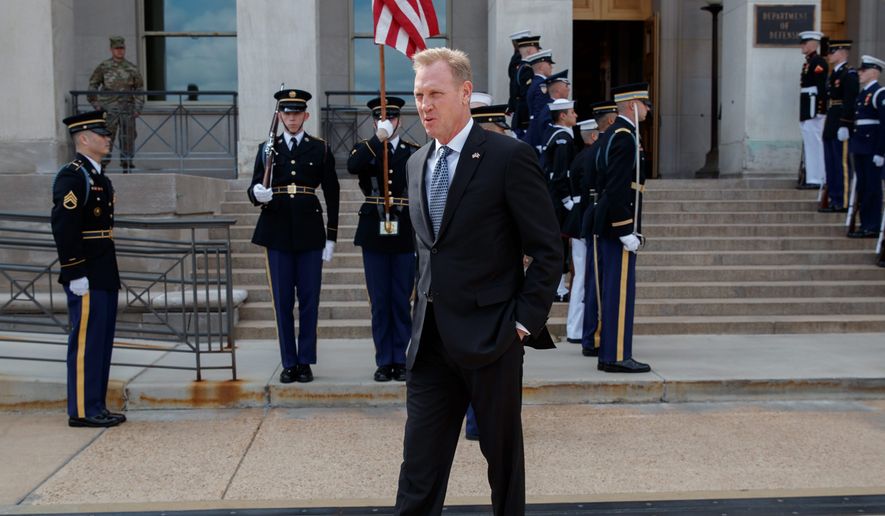Patrick M. Shanahan’s success in the corporate world may soon cost him in the political one.
Mr. Shanahan’s 30-year history at Boeing could be a crippling political liability if the acting secretary of defense is nominated to become permanent Pentagon chief. Analysts say accusations of favoritism and two recent deadly crashes of Boeing aircraft could create a perfect storm capable of sinking his prospects.
Mr. Shanahan, who took over at the Pentagon on Jan. 1 after spending three decades as a top executive at Boeing, now faces a Defense Department inspector general investigation into whether he used his position to steer lucrative contracts toward his former employer and away from rival companies such as Lockheed Martin. He has consistently denied those accusations.
With President Trump under mounting pressure to fill one of his Cabinet’s top posts in the wake of James N. Mattis’ resignation in December, Mr. Shanahan may face sharp questioning Tuesday at a scheduled House Armed Services Committee hearing on the Pentagon’s proposed fiscal 2020 budget.
Outside the Pentagon, Boeing finds itself in crisis mode. Virtually every country in the world, including the U.S., grounded the company’s 737 Max aircraft this month after major crashes in Indonesia and Ethiopia over the past five months.
The whirlwind of negative publicity around Boeing could spill over onto Mr. Shanahan during Senate confirmation hearings if Mr. Trump nominates him, analysts say.
The acting secretary also would face a withering assault from Democrats, who would argue that he is using his power to push taxpayer money toward Boeing at a time when public confidence in his former employer has plummeted.
“I’m not sure he really appreciates what could be ahead,” said Mark F. Cancian, a senior adviser with the International Security Program at the Center for Strategic and International Studies and a retired Marine Corps colonel.
“The fact that a Boeing aircraft … has problems is not his responsibility,” Mr. Cancian said. “But telling members of Congress that something is an unfair line of questioning doesn’t get traction. It’s about perception. It’s about grandstanding. It’s about all of those things.”
Before coming to the Defense Department in July 2017, Mr. Shanahan held top positions at Boeing, including as its senior vice president of supply chain and operations. Until he was tapped as Mr. Mattis’ top deputy in 2017, Mr. Shanahan had no government experience.
Boeing woes
During budget hearings this month, Democrats pressed Mr. Shanahan on whether he had any contact with Boeing about the two recent crashes or broader problems with the 737. They also asked whether he had been briefed personally on how the company was handling the crisis or had spoken with anyone inside Boeing about the crashes.
Mr. Shanahan said he had not. He also expressed strong support for ongoing federal investigations into the causes of the crashes.
The same week Mr. Shanahan was being questioned on Capitol Hill, reports surfaced that Boeing had left tools and other debris inside tankers it delivered to the Air Force.
The Air Force’s acquisition chief, Will Roper, blasted the “severe situation” inside the company that allowed such mistakes to happen.
Boeing said the issues of “foreign object debris” will be resolved.
“Safety and quality are our highest priority,” company spokesman Todd Belcher told Defense One two weeks ago. “We are committed to deliver FOD-free aircraft to our customer and have an agreed-upon action plan in place going forward. We will continue to work with the Air Force on the schedule for upcoming deliveries.”
Although those issues could undermine lawmakers’ faith in Boeing and anyone associated with it, it’s Mr. Shanahan’s reported actions since leaving the company that ultimately could make his nomination hopes problematic.
Last week, the Pentagon’s inspector general’s office confirmed that it will formally investigate complaints that Mr. Shanahan violated ethical guidelines and tried to push business toward his former employer.
“The Department of Defense Office of Inspector General has decided to investigate complaints we recently received that Acting Secretary Patrick Shanahan allegedly took actions to promote his former employer, Boeing, and disparage its competitors, allegedly in violation of ethics rules,” the inspector general said in a statement.
Leading watchdog group Citizens for Responsibility and Ethics in Washington first asked for the inspector general to start such an inquiry.
Pentagon officials have denied that Mr. Shanahan has in any way favored Boeing and say he has abided by an ethics agreement to recuse himself from any matters involving the company.
“Sec. Shanahan has at all times remained committed to complying with his ethics agreement, which screens Boeing matters to another DoD official and ensures no potential for a conflict of interest with Boeing on any matter,” Lt. Col. Joe Buccino, a spokesman for the secretary, said in a statement. “Secretary Shanahan remains focused on increasing lethality across the military and aligning the department along the National Defense Strategy.”
Even amid all of the firestorms involving Boeing, sources familiar with Mr. Shanahan’s thinking say he still wants the nomination.
More importantly, analysts say Mr. Trump — unlike a more conventional president — may not be dissuaded by the controversies involving Boeing. Some reports say there are few obvious and willing alternatives to Mr. Shanahan, given Mr. Mattis’ often rocky tenure as head of the Pentagon.
Mr. Shanahan appeared behind the president Monday at a White House meeting with Israeli Prime Minister Benjamin Netanyahu, alongside Vice President Mike Pence and Secretary of State Mike Pompeo.
“I don’t think Trump really cares,” Mr. Cancian said. “A different White House would look at the political price they’d have to pay to shove Shanahan through and decide it’s not worth it.”
• Ben Wolfgang can be reached at bwolfgang@washingtontimes.com.




Please read our comment policy before commenting.